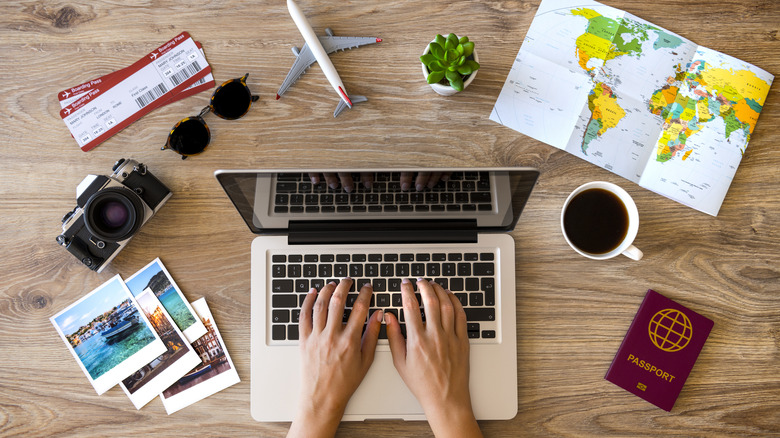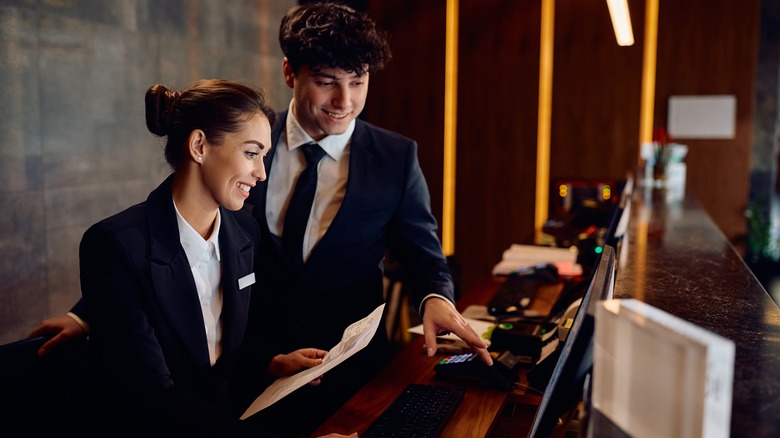The Popular Hotel Booking Method Rick Steves Strongly Advises Against
These days, there are a multitude of ways to secure your reservation for the hotel room of your dreams in Europe. One popular and efficient method is to use one of the dozens of booking websites to find great deals, after which you simply hit a button to reserve a room. Some of these sites, like Booking.com, provide traveler ratings and reviews to promote transparency and the sharing of consumer experiences, which can be extremely helpful when you're not familiar with a particular destination.
However, as travel expert Rick Steves points out in his blog, there are economic implications each time you use one of these booking websites to secure a room. The ripple effects go far beyond your own bank account, contributing to trends that are reshaping the travel industry as a whole. For example, some of these sites (Booking.com, Expedia.com, and others) charge independent hotels up to a 25% commission fee for each reservation, which really eats into the hotels' profits and threatens their viability as a business. "The best way to support small, family-run hotels — and get a better price — is to do your research online and then book directly with hotels by phone or email," says Steves.
How travelers benefit from direct bookings
In his blog, Rick Steves shared that many of his readers have reported savings and other perks when reserving rooms directly through hotels versus using booking websites. These perks can include things like loyalty program points, free amenities, room upgrades, more relaxed rules about cancellations, and better customer service. "Joanne wrote that before she traveled to France last summer, she researched hotels on Booking.com, Expedia.com, and TripAdvisor.com — and then made reservations directly on each hotel's website. She ended up saving €20/day, got free breakfasts, and was upgraded to a larger room," noted Steves. Très bon!
In addition, readers shared some intangible benefits that resulted from interacting with humans rather than websites when making their reservations. For example, some were able to practice their foreign language skills, which was both rewarding and entertaining: "Maria wrote that one of her sweetest travel memories was using her very basic Italian and 'lots of humor' to book a family-run hotel in Montepulciano." Another of Steves' readers commented that corresponding directly with hotel owners allowed him to begin establishing connections with locals before he even started his vacation. These small interactions might seem insignificant, but in fact, they are paving the way for you to have a more authentic, local experience when you eventually arrive at your destination.
Tips for getting deals and upgrades when booking direct
There are a few things you can do to maximize your chances of getting the best deals and perks when booking directly through a hotel. First, before booking direct, definitely do online research to learn about the various hotel options in your destination. Compare prices on different sites and read the reviews on Booking.com, Google, and Tripadvisor — and avoid the dirty trick that hotel booking websites use to get you to make an immediate reservation. After you've selected a hotel, go directly to the hotel's website to obtain the contact information you need.
When communicating with the hotel staff in writing or over the phone, Rick Steves suggests that you be open with the hotel about why you are booking direct. "I have a hunch that you'll generally be charged less and treated better by hotels if, when booking directly with them, you let them know that you avoid middlemen on principle, so that hotels can be more profitable and provide a better value — and that you'd appreciate a preferred price or service, if possible," he says in his blog. If you are traveling to a hotel for a special occasion like a birthday or anniversary, definitely also mention this in your communication. While making this and any other request, be as respectful as you can be to whomever you are speaking, and recognize that politeness, a simple smile, and knowing a few words or phrases of the local language go a long way in almost every culture.


